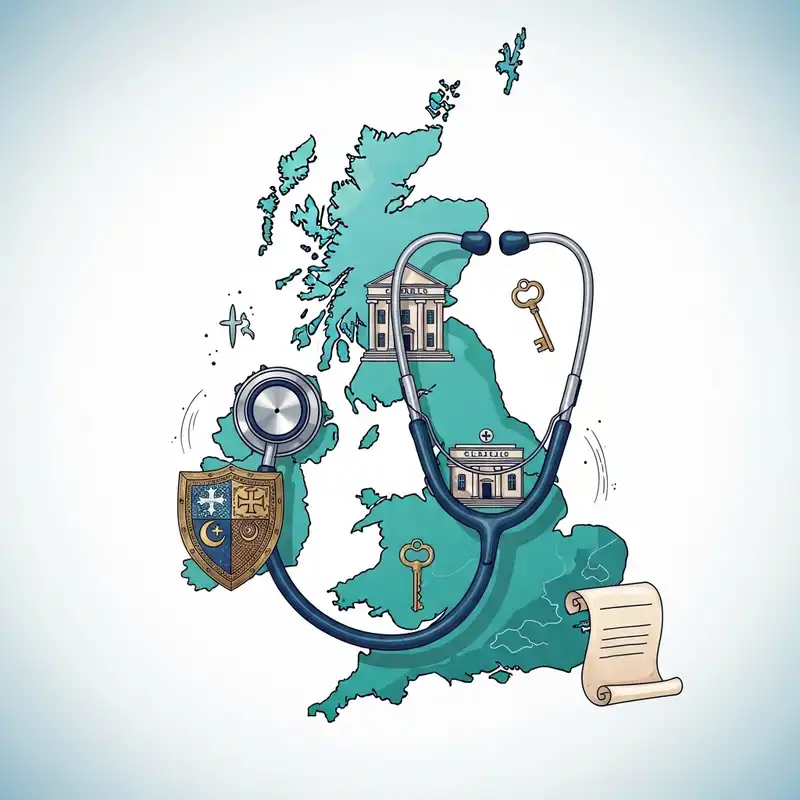TL;DR
In our pursuit of a better self—whether that’s climbing the career ladder, launching a business, mastering a new skill, or raising a family—we rightly celebrate qualities like resilience, determination, and grit. We build vision boards, set SMART goals, and invest in courses and coaching. Yet, we often overlook the very foundation upon which all this ambition rests: our health and our ability to earn an income.
Key takeaways
- Long-Term Sickness: The Office for National Statistics (ONS) reported that in 2023, a record 2.8 million people were out of work due to long-term sickness, a significant increase in recent years. The leading causes included musculoskeletal problems, cardiovascular issues, and mental health conditions.
- Workplace Injuries: For those in physically demanding roles, the risks are even more acute. The Health and Safety Executive (HSE) statistics for 2022/23 show that 561,000 workers sustained a non-fatal injury, with 1.8 million suffering from a work-related illness. For a self-employed electrician, plumber, or nurse, an injury doesn't just mean pain; it means an immediate and complete loss of income.
- Mental Health: The Mental Health Foundation notes that 1 in 6.8 people experience mental health problems in the workplace. Conditions like severe stress, anxiety, or depression can be just as debilitating as a physical illness, often requiring extended time off to recover.
- Survival Mode Replaces Growth Mode: Your focus shifts from learning, creating, and advancing to simply paying the mortgage, utility bills, and grocery costs.
- Ambitions are Shelved: The budget for that master's degree, business startup capital, or coding bootcamp is redirected to cover daily living expenses.
Beyond Grit the Unseen Force Behind True Personal Growth
In our pursuit of a better self—whether that’s climbing the career ladder, launching a business, mastering a new skill, or raising a family—we rightly celebrate qualities like resilience, determination, and grit. We build vision boards, set SMART goals, and invest in courses and coaching. Yet, we often overlook the very foundation upon which all this ambition rests: our health and our ability to earn an income.
This isn't pessimism; it's intelligent preparation. Building a life of meaning and achievement without safeguarding it against predictable risks is like constructing a beautiful home on unstable ground. This guide will explore the often-unseen forces that truly enable personal growth: the financial resilience and peace of mind that come from a robust protection strategy.
The Modern Reality: Why Our Best-Laid Plans Are More Vulnerable Than Ever
The path to personal growth is rarely a straight line. It's fraught with challenges, but the most disruptive are those that strike at our core ability to function and provide. The statistics paint a sobering picture of the risks we all face in the UK.
According to Cancer Research UK, the forecast that 1 in 2 people in the UK will be diagnosed with cancer in their lifetime highlights a stark, widespread vulnerability. This isn't a remote possibility; it's a mainstream probability. (illustrative estimate)
But it’s not just cancer. Consider these realities:
- Long-Term Sickness: The Office for National Statistics (ONS) reported that in 2023, a record 2.8 million people were out of work due to long-term sickness, a significant increase in recent years. The leading causes included musculoskeletal problems, cardiovascular issues, and mental health conditions.
- Workplace Injuries: For those in physically demanding roles, the risks are even more acute. The Health and Safety Executive (HSE) statistics for 2022/23 show that 561,000 workers sustained a non-fatal injury, with 1.8 million suffering from a work-related illness. For a self-employed electrician, plumber, or nurse, an injury doesn't just mean pain; it means an immediate and complete loss of income.
- Mental Health: The Mental Health Foundation notes that 1 in 6.8 people experience mental health problems in the workplace. Conditions like severe stress, anxiety, or depression can be just as debilitating as a physical illness, often requiring extended time off to recover.
When illness or injury strikes, the immediate impact is the loss of income. But the ripple effects are what truly dismantle a journey of personal growth.
- Survival Mode Replaces Growth Mode: Your focus shifts from learning, creating, and advancing to simply paying the mortgage, utility bills, and grocery costs.
- Ambitions are Shelved: The budget for that master's degree, business startup capital, or coding bootcamp is redirected to cover daily living expenses.
- Family Stress Escalates: Financial strain is a leading cause of stress in relationships. The pressure can impact not only you and your partner but also your children's sense of security and their own opportunities for development.
- Assets May Be Lost: Without a financial buffer, families may be forced to sell their homes or liquidate savings and investments, setting them back years, if not decades.
Imagine a self-employed marketing consultant, thriving in her new business. She suffers a serious back injury in a car accident and is unable to sit at a desk for six months. With no sick pay, her income vanishes overnight. Her business plans crumble as she drains her savings to cover her mortgage. Her personal growth journey has been violently derailed, replaced by a desperate fight for financial survival. This is the reality that a lack of protection creates.
The Architect's Toolkit: How Protection Insurance Builds a Fortress Around Your Goals
Thinking about these risks isn't meant to cause fear, but to empower you to act. Just as an architect designs a building with foundations, fire escapes, and structural supports, you can design your financial life to withstand unexpected shocks. Protection insurance products are the essential materials for this construction.
They aren’t just "policies"; they are powerful enablers of growth. Let's break down the key tools.
Income Protection (IP): Your Personal Salary When You Can't Work
Often considered the bedrock of any financial plan, Income Protection is arguably the most important cover for any working adult.
- What it is: A policy that pays you a regular, tax-free monthly income if you are unable to work due to any illness or injury. This income is typically 50-70% of your gross salary and pays out after a pre-agreed waiting period (e.g., 4, 13, 26, or 52 weeks) until you can return to work, the policy term ends, or you retire.
- The Personal Growth Angle: Income Protection does more than just pay the bills. It preserves your entire ecosystem of growth. With your income secure, you can:
- Focus entirely on recovery: You have the mental space to heal without the crushing anxiety of financial ruin.
- Maintain your lifestyle: You can continue paying the mortgage, funding your children’s clubs, and maintaining your standard of living.
- Keep your goals on track: You can still make pension contributions and continue your savings and investment plans, ensuring your long-term future isn't sacrificed for a short-term crisis.
- Avoid debt: You won't need to rely on credit cards or loans to get by.
For tradespeople, nurses, freelancers, and anyone without generous employer sick pay, a variant known as Personal Sick Pay can offer invaluable short-term cover, often paying out from day one of incapacity for up to one or two years. It's a crucial first line of defence.
Critical Illness Cover (CIC): Your Financial Reset Button
While Income Protection handles the monthly cash flow, Critical Illness Cover is designed to absorb a major financial shock.
- What it is: A policy that pays out a tax-free lump sum on the diagnosis of a specific, serious illness defined in the policy document (e.g., cancer, heart attack, stroke, multiple sclerosis).
- The Personal Growth Angle: This lump sum provides one of the most powerful assets during a crisis: options. It gives you the freedom to make choices based on your wellbeing, not your bank balance. You could use the money to:
- Clear your mortgage: Removing your single largest monthly outgoing provides immense psychological relief.
- Fund private treatment: Access specialist drugs or therapies not yet available on the NHS, potentially speeding up your recovery (more on this later).
- Adapt your home: Make necessary modifications, such as installing a stairlift or converting a bathroom.
- Replace a partner's income: Allow your partner to take time off work to care for you without financial penalty.
- Create a financial bridge: Simply use it to cover your expenses for a year or two, allowing you to step back, recover, and reassess your life and career goals from a position of strength.
Life Insurance (Life Protection): The Ultimate Peace of Mind
Life Insurance is the cornerstone of protecting your loved ones and ensuring their journey of growth can continue even if yours is cut short.
- What it is: A policy that pays out a lump sum (or a regular income, in the case of Family Income Benefit) to your beneficiaries upon your death.
- The Personal Growth Angle (For You): The peace of mind that Life Insurance provides is a powerful enabler. Knowing your family is financially secure frees you up to pursue your own ambitions with more confidence. You can take calculated career risks, start that business, or invest in your own development, knowing that your loved ones' future isn't solely dependent on your continued presence.
- The Personal Growth Angle (For Your Family): For your family, the payout is a lifeline. It ensures their world doesn't collapse financially at the worst possible emotional time. It means:
- The mortgage is paid, and they can stay in the family home.
- Children's education plans remain intact.
- The surviving partner has the financial breathing room to grieve and rebuild their life without immediate pressure to return to work or make drastic financial decisions.
Family Income Benefit (FIB): A Simpler Way to Protect
Family Income Benefit is a type of life insurance, but it works differently and can be a more manageable and affordable solution for young families.
- What it is: Instead of a single large lump sum, FIB pays out a smaller, regular, tax-free monthly or annual income to your family. This income is paid from the time of your death until the end of the policy term.
- The Personal Growth Angle: Its power lies in its simplicity. It directly replaces your lost monthly salary, making it incredibly easy for the surviving partner to budget and manage finances. This maintains stability and normality for children, ensuring their environment remains secure and their own development opportunities are preserved.
Beyond the 9-to-5: Specialised Protection for Entrepreneurs and Skilled Professionals
The need for a robust financial safety net is universal, but it becomes critically important for those who operate outside the traditional PAYE system. Business owners, directors, freelancers, and the self-employed are the engines of the UK economy, but they are also the most exposed to financial shocks.
For the Self-Employed and Freelancers
When you work for yourself, you are the business. If you stop, the income stops. There is no employer sick pay scheme, no death-in-service benefit, and no one to pick up the slack.
- Essential Cover: Income Protection is not a luxury; it's an essential business overhead, as vital as your laptop or your tools. It's your personal sick pay, your disability cover, and your financial continuity plan all rolled into one.
- The Risk: An IT contractor suffering from burnout, a plumber with a broken wrist, a graphic designer with repetitive strain injury—all face an immediate income crisis.
- The Solution: A tailored IP or Personal Sick Pay policy ensures that a health setback doesn't bankrupt your business and your household.
For Company Directors and Business Owners
If you run a limited company, you have more sophisticated and tax-efficient tools at your disposal to protect not only yourself and your family but the business itself.
- Key Person Insurance: What would happen to your business if your top salesperson, genius developer, or you yourself were suddenly unable to work long-term or passed away? Key Person Insurance is a policy taken out and paid for by the business on the life of a crucial individual. The payout goes to the business to cover lost profits, recruit a replacement, or clear business debts, ensuring the enterprise you've worked so hard to build can survive and continue to grow.
- Executive Income Protection: This is an Income Protection policy owned and paid for by your company for a specific director or employee. It's a highly valued benefit that can protect your key people. Crucially, the premiums are typically classed as a legitimate business expense, making it a very tax-efficient way to provide cover.
- Relevant Life Cover: This is a company-paid death-in-service policy for a director or employee. Like Executive IP, the premiums are usually an allowable business expense and it doesn't count towards the individual's lifetime pension allowance. It provides family protection in a more tax-efficient manner than a personal policy.
This table summarises the different needs:
| Persona | Key Risks | Primary Protection Solution | Growth Enablement |
|---|---|---|---|
| Employee (PAYE) | Limited employer sick pay, mortgage, family costs. | Personal Income Protection, Critical Illness, Life Insurance. | Protects against gaps in employer benefits, securing personal goals. |
| Freelancer/Self-Employed | No sick pay, income stops immediately, business continuity. | Income Protection (essential), Critical Illness Cover. | Acts as your personal safety net, allowing you to work for yourself with confidence. |
| Company Director | Personal risk, business risk (losing key people), attracting talent. | Key Person Ins, Executive IP, Relevant Life Cover. | Protects the business itself, ensuring its survival and continued growth. |
At WeCovr, we specialise in helping business owners navigate these options. We can analyse your business structure and personal goals to recommend the most tax-efficient and effective combination of personal and business protection.
Securing Your Legacy: The Role of Gift Inter Vivos Insurance
True personal growth often culminates in a desire to create a lasting legacy and empower the next generation. This frequently involves passing on wealth during your lifetime, for instance, by gifting a deposit for a child's first home. However, this generous act can come with a hidden tax sting.
- The 7-Year Rule: In the UK, when you give a gift of assets or cash (a "Potentially Exempt Transfer" or PET), it is exempt from Inheritance Tax (IHT) only if you live for a full seven years after making the gift. If you pass away within that 7-year window, the value of the gift is added back into your estate and may be subject to IHT at a rate of up to 40%.
- The Problem: This creates a significant potential liability for the recipient of your gift. The child you helped with a £50,000 house deposit could suddenly face a £20,000 tax bill they cannot afford.
- The Solution: Gift Inter Vivos Insurance: This is a specialised type of life insurance policy designed specifically to solve this problem. It's a form of "decreasing term assurance" where the potential payout reduces over the 7-year period, mirroring the tapering relief on the IHT liability. If you die within the seven years, the policy pays out to cover the exact IHT bill, ensuring your gift reaches your loved one in full.
This clever piece of planning isn't just about tax; it's about the freedom to be generous. It allows you to support your family's growth and ambitions today, with the absolute certainty that your gift will be a blessing, not a burden.
The Fast Track to Recovery: How Private Health Insurance Complements Your Protection Plan
While protection insurance provides the financial resilience to weather a health crisis, Private Medical Insurance (PMI) provides the physical resilience by accelerating your access to healthcare. In the context of personal growth, time is your most valuable asset. The longer you are unwell and waiting for treatment, the longer your life and ambitions are on hold.
The NHS is a national treasure, but it is under immense pressure. Waiting lists for consultations, scans, and non-urgent procedures can be extensive.
- The PMI Advantage: Private Health Insurance allows you to bypass these queues. Its key benefits include:
- Prompt Diagnosis: Quickly see a specialist for a consultation and get access to diagnostic tests like MRI and CT scans, often within days or weeks.
- Faster Treatment: Receive eligible treatment, such as surgery, at a time and in a private hospital of your choice.
- Access to Specialist Care: Gain access to certain cancer drugs or therapies that may not be routinely available on the NHS.
- Comfort and Privacy: Recover in a private room with more flexible visiting hours.
The synergy between protection insurance and PMI creates a powerful, holistic support system:
| Scenario: You are diagnosed with a serious condition requiring surgery. |
|---|
| Private Medical Insurance (PMI) Role |
| Critical Illness Cover (CIC) Role |
| Income Protection (IP) Role |
This integrated approach minimises the disruption to your life. Faster diagnosis and treatment mean a faster recovery. A faster recovery means you get back to your family, your work, and your personal growth journey sooner.
More Than a Policy: Embracing a Proactive Wellness Mindset
The modern insurance landscape is evolving. Insurers recognise that it's better to help customers stay healthy than to simply pay out when they get sick. This has led to a welcome shift, with many protection and health insurance policies now including a suite of wellness benefits designed to support your proactive health goals.
These can include:
- Discounted gym memberships
- Access to virtual GP services 24/7
- Mental health support and counselling sessions
- Health and wellness apps
- Wearable tech discounts
- Regular health screenings
This aligns perfectly with our philosophy. At WeCovr, we believe in this holistic approach. That's why, in addition to helping you find the perfect protection plan, we provide our clients with complimentary access to CalorieHero, our AI-powered calorie tracking app, to support your health and wellness goals every day.
Embracing simple, evidence-based habits can dramatically reduce your risk of many of the conditions that trigger insurance claims:
- Diet: A balanced diet rich in fruits, vegetables, and whole grains, and low in processed foods and saturated fats, is proven to lower the risk of heart disease, stroke, type 2 diabetes, and certain cancers.
- Exercise: The NHS recommends at least 150 minutes of moderate-intensity activity a week. Regular exercise boosts mental health, strengthens your cardiovascular system, and helps maintain a healthy weight.
- Sleep: Prioritising 7-9 hours of quality sleep per night is crucial for cognitive function, immune response, and mental resilience. Chronic sleep deprivation is linked to a host of health problems.
By combining a proactive wellness mindset with a robust insurance safety net, you create the ultimate foundation for lifelong growth.
Navigating Your Options: How to Build Your Personalised Protection Strategy
The world of protection can seem daunting, but the principle is simple: to create a plan that is perfectly tailored to your unique life. There is no one-size-fits-all answer. The right cover for a 25-year-old single renter is vastly different from that needed by a 45-year-old business owner with three children.
Key factors to consider when building your strategy include:
- Your Dependants: Do you have a partner or children who rely on your income?
- Your Debts: What is the outstanding balance on your mortgage and any other loans?
- Your Occupation: Are you in a high-risk job? Are you self-employed?
- Your Employer Benefits: What sick pay and death-in-service benefits does your employer provide, if any?
- Your Health: Do you have any pre-existing conditions?
- Your Aspirations: What future goals are you working towards that need protecting?
Here’s a simplified look at how needs evolve:
| Life Stage | Primary Concerns | Key Protection Products |
|---|---|---|
| 20s - Starting Out | Protecting future income, student debt. | Income Protection is key. A small Life Insurance policy. |
| 30s - Family & Mortgage | Protecting family, covering the mortgage. | Life Insurance & CIC (to clear mortgage), Family Income Benefit, IP. |
| 40s/50s - Peak Earning | Protecting business, wealth, legacy planning. | Executive IP, Key Person Ins, Gift Inter Vivos, Private Health Insurance. |
The landscape of protection insurance is complex, but you don't have to navigate it alone. Working with an expert broker like us at WeCovr is crucial. We take the time to understand your unique circumstances and aspirations. We then compare policies and premiums from all the UK's leading insurers to build a bespoke protection portfolio that acts as the unshakeable foundation for your personal growth.
Beyond Grit: The Freedom to Flourish
We began by acknowledging the power of grit and determination. These qualities are essential for achieving anything worthwhile. But they are not enough. True, sustainable personal growth requires more than just the will to push forward; it requires the wisdom to prepare for when you might be pushed back.
Financial protection is not an admission of weakness or a sign of pessimism. It is the ultimate expression of strength and optimism. It is the act of valuing your future—and your family's future—enough to build a fortress around it.
It’s the unseen architect that ensures your life’s work can withstand an earthquake. It’s the quiet enabler that transforms vulnerability into resilience. It’s the financial foundation that gives you the peace of mind to stop worrying about survival and focus on what truly matters: your growth, your ambitions, and your happiness.
Don't let your journey of growth be a tightrope walk without a safety net. Build your foundation, protect your ambitions, and give yourself the ultimate freedom: the freedom to truly flourish.
Isn't Statutory Sick Pay enough to live on?
I'm young and healthy, do I really need protection insurance?
Can I get cover if I have a pre-existing medical condition?
Is this type of insurance expensive?
What's the main difference between Income Protection and Critical Illness Cover?
How does an expert broker like WeCovr help?
Sources
- Office for National Statistics (ONS): Mortality and population data.
- Association of British Insurers (ABI): Life and protection market publications.
- MoneyHelper (MaPS): Consumer guidance on life insurance.
- NHS: Health information and screening guidance.

































